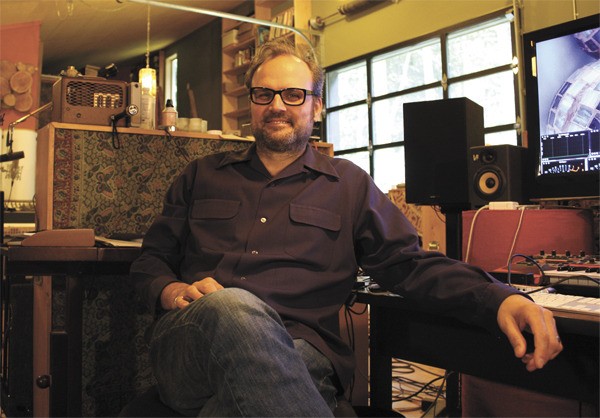Later this month, Islander Jason Staczek will head out to Park City, Utah, to participate in The Sundance Institute’s 2012 Feature Film Composers Lab.
Staczek, a composer, keyboardist and record producer, has been named a fellow in the prestigious program. Along with five other international composers, he’ll spend two weeks at Sundance participating in a marathon of workshops, creative exercises and collaborations with leading composers, film music pros and up-and-coming film directors.
The Sundance Institute was founded in the 1980s by Robert Redford to advance the work of independent storytellers in film and theater. Most famously, it presents the Sundance Film Festival, the largest festival of independent cinema in the United States.
The bar to being named a Sundance fellow is high, and winning a slot in the composer’s lab is something that has taken Staczek a long time. This was the sixth year in a row that he had applied for a slot, after first being encouraged to do so by a Sundance official.
And even after he was accepted at long last, Staczek said he was hesitant to tell anyone that he had received the honor.
“I wanted to wait until the press release came out,” he said. “I thought they might call me back and say, ‘Oh, we only have room for five this year.’”
Despite his modesty, Staczek — a soft-spoken, bearded 46-year-old who peers out at the world through stylish horn-rimmed glasses — is highly respected and increasingly known in the world of independent film.
His scores for the films of Canadian auteur Guy Maddin have been called “swirling and adventurous,” and their latest work together, “Keyhole,” is currently in theaters worldwide. His work on Maddin’s 2006 silent film, “Brand Upon the Brain,” took him on a whirlwind trip to three continents to conduct the score with live orchestras at festival screenings, and many of his other films have also traveled to top festivals around the globe. All told, he has scored 20 films since 2004, when he got his first real break in the business — being appointed as staff composer for The Film Company, an offshoot of Seattle’s Northwest Film Forum.
He moved to the Island six years ago with his wife Ellen Parker and young daughter, Ivy, from Seattle’s Fremont neighborhood. Before that, he had spent many years working as a recording artist, record producer and performer.
Staczek said Vashon has been an ideal place for him to raise a family and pursue his work as a composer.
“One of the big motivations for moving here was to have the space and the silence,” he said. “Having a studio in the middle of 10 acres with natural light that is absolutely quiet and still … I just can’t do it with the city buzzing all around me.”
On Vashon, Staczek has also formed alliances with a number of local musicians and artists.
He frequently collaborates with Island musical inventor Ela Lamblin, writing for Lamblin’s experimental instruments such as the Shrimp Platter, a room-sized percussion instrument made out of aluminum tubes and colored glass resonators. The instrument can be heard throughout the soundtrack of “Keyhole.” The score also has several interludes that feature the haunting soprano voice of Island diva Elizabeth Ripley.
Last year, Staczek joined forces with Island singer/songwriter and guitarist Ian Moore to form Madrona Music, a company that creates music for films, commercials, television and the web.
And most recently, Staczek shared his talents with Vashon audiences in the play “Through the Garden Gate,” an original Blue Heron production for which he composed the music and performed it with a small music ensemble.
But composing for film is clearly Staczek’s passion, the thing that excites him most as an artist.
“I love the thing that happens when music gets married to picture on the screen, and then it becomes a third thing,” he said. “I love the challenge of getting to work on a film that has no music and then figuring out what the music wants to be. It’s a problem solving thing that leads to this weird alchemy that winds up being pure emotion on screen.”


